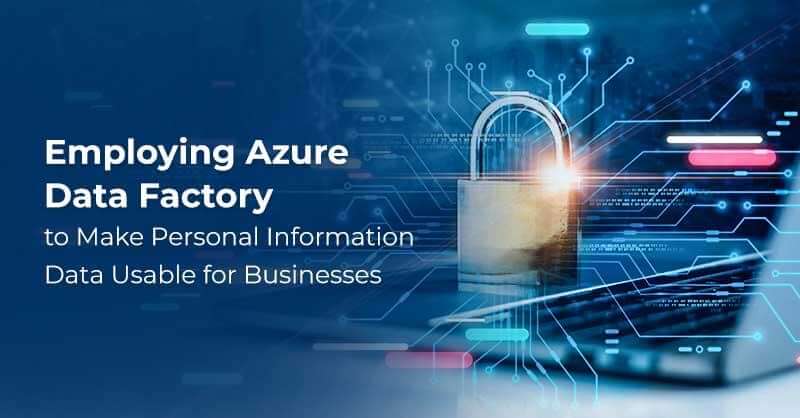Employing Azure Data Factory to Make Personal Information Data Usable for Businesses

Written by Hafsa Mustafa
Technical Content Writer
November 9, 2022
Businesses in different industries often hire third parties to carry out data migration and transformation on their disparate data stores to obtain data integration for decision-making purposes. However, data migration can be a tricky thing. Although it makes a unified view possible, it runs the risk of exposing corporate data related to the personal information of clients, employees, and partners – which tends to be sensitive and highly critical. Data leakages and losses in such instances can significantly hurt a business and even result in litigation.
Dive into this blog to learn Azure Data Factory can be used to copy personal information data without exposing its contents.
What Is Azure Data Factory?
Azure Data Factory (ADF) is a cloud-based data integration and ETL and ELT platform that enables data engineers to move data on traditional as well as cloud data storage systems. It is serverless and works by orchestrating scalable data pipelines for data movement. By ensuring integration and automating migration, ADF optimizes different data flows for businesses.
The outstanding features of Azure Data Factory are that it only charges you according to your consumption and takes care of the jobs scheduling and running of pipelines without requiring you to write any code. In this way, even non-technical people can make good use of it. Here’s the basic architecture of ADF:
Why Is Data Confidentiality Important?
Protecting confidential data is of utmost importance for businesses as losing data can cost them clients, and data leakages can result in fraudulent practices and other legal activities. Such phenomena can also cause the clients to lose their trust, besides damaging the reputation of the enterprise. Things may also take a turn for the worse if legal actions are taken by those affected.
How Can Businesses Benefit From ADF?
At some point, every growing business feels the need to cross the bridge of undertaking data migration to achieve a single source of truth. This is often necessitated as the data keeps growing on a daily basis. Data integration undoubtedly brings considerable benefit to organizations as it helps:
- Shift to modern data architecture from legacy systems
- Marketing departments to make personalized advertisement campaigns
- Sales teams to craft efficient pricing strategies
- Business Intelligence personnel to identify and predict churn rates and at-risk clients
- Data scientists generate predictive analytics related to different aspects
Azure Data Factory makes data encryption possible prior to data transformation and movement. In this way, ADF makes extracting meaningful insights from the available data immensely easier and safe by automating data integration workflows and masking data during processing. It supports close collaboration and data sharing between different organizational departments. Businesses can now smoothly migrate to the cloud and make data effortlessly accessible for all their employees.
Integration of Personal Information Data through ADF
We recommend using Azure Data Factory as it allows us to mask or encrypt our data with the help of its feature mapping DataFlow. One can easily map the data by accessing the “mapping” option on the ADF interface. In this way, the sensitive data coming from the source to the sink will automatically be encrypted.
Likewise, we also prefer using other transformation functions in ADF to create new columns and concatenate columns. Concatenation means combining different columns so when they show up on the target site, they represent multiple data items.
We can collect data, mask it, and further transform it to eventually move it to another location. The whole process will look like this:
Conclusion
Azure Data Factory helps businesses maintain the privacy of their data during data migration and integration. By automating pipeline orchestration and running, ADF is simplifying data movement between on-premises and cloud-based data systems.
How can Royal Cyber Help You?
Royal Cyber data analytics experts have years of experience helping businesses unleash the true power of their data and extract valuable insights. Our data team can guide you on how you can form a single reliable source of truth for all your departments and realize your business goals in an efficient manner. If you have any queries or points to discuss, feel free to contact our experts.
Recent Blogs
- An Insight into ServiceNow Hardware Asset Management (HAM) Ramya Priya Balasubramanian Practice Head ServiceNow Gain …Read More »
- Learn to write effective test cases. Master best practices, templates, and tips to enhance software …Read More »
- In today’s fast-paced digital landscape, seamless data integration is crucial for businessRead More »





